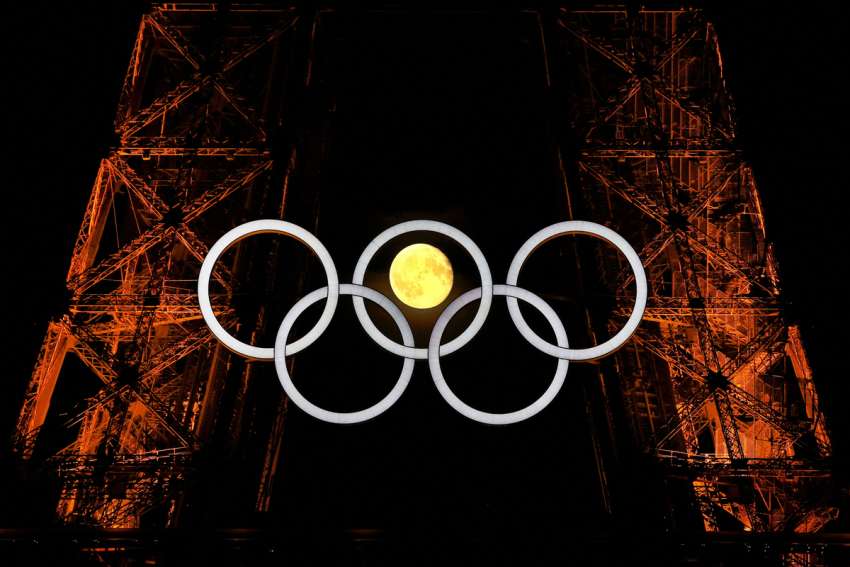Christians, Jews, Muslims, Buddhists and Hindus came to talk about their experiences at the multifaith centre in the Olympic Village and discuss the values of faith and sports.
The event followed backlash against several scenes at the Games’ opening ceremony — in the week following the event — from a number of religious leaders across the world. A scene that had drag performers and nudity in a reinterpretation of Leonardo da Vinci’s The Last Supper drew the most anger.
The interfaith meeting has a long tradition. A similar meeting of faith leaders had taken place at Notre Dame 100 years earlier, in 1924, during the Paris Olympic Games, at the initiative of Pierre de Coubertin, who had relaunched the Olympic Games in the modern era in 1894.
Thomas Bach, president of the International Olympic Committee, and Tony Estanguet, president of the Paris 2024 Organizing Committee for the Olympic and Paralympic Games, were welcomed by Archbishop Laurent Ulrich of Paris, and the French capital’s Auxiliary Bishop Philippe Marsset, who was delegated by the archdiocese to oversee the Olympic Games and Holy Games initiative. Bishop Emmanuel Gobilliard of Digne, the Holy See’s special representative for the Olympics, was also there along with the mayor of Paris, Anne Hidalgo, and Chief Rabbi of France Haïm Korsia.
Meeting in front of the cathedral — set to reopen Dec. 8 after five years of renovations following a devastating 2019 fire — under the theme “How does sport mobilize the best in man and humanity,” religious leaders emphasized how sport can be a powerful sphere of positive values and unity for mankind.
“Faith and sport share many of the same values that guide us to live together in peace with our fellow human beings,” the IOC’s Bach said in his remarks.
During the event Bach said that “the Olympic Games are first and foremost about sport. But they are also about much more than sport. They are about: Togetherness. Hope. Solidarity. Peace.”
François Morinière, former managing director of the French sports daily L’Equipe, is a member of the organizing committee for the interfaith meeting. He is co-founder of the Holy Games Catholic initiative. He recounted the origins of the interfaith gathering at Notre Dame Cathedral.
“The idea came in 2021, one evening during an exchange with Thomas Bach, whom I had known for a long time,” he said. “He was (the one) … who insisted that it take place. We took it upon ourselves to implement it … It is therefore the fruit of friendship, fidelity and gratuity.”
Bach emphasized Aug. 4 that while sports and faith share values and “like faith, sport can guide us on how to lead better, more meaningful lives,” and, like faith, “sport can bring out the best in us to live “in solidarity and peace with our fellow humans.” Nevertheless, “sport is not a religion,” Bach said.
Sport “cannot answer the ultimate questions on the meaning of our existence. Only faith can give answers to the really existential questions of life, death and of the divine. Only faith can guide us in our acceptance of divine transcendence,” said Bach, who participated in the Mass in La Madeleine Church for the launching of the Olympic truce July 19.
“Sport is not a religion. Our remit (concern) is the Olympic Games. Our earthly pursuit is to bring the entire world together in peaceful competition,” he underlined. “In our world torn apart by so many wars, hate and aggression, the Olympic Games are the only event that still manages to bring together the entire world in peaceful competition.”
For Morinière, Bach’s speech in front of Notre Dame was “particularly powerful.”
“The moment of silence that followed the speeches was very meaningful,” said Morinière. “It was a beautiful moment of recollection.”
The French sport journalist and editor was struck by personal tragedy in 2013 when his eldest daughter was killed in a bus crash in French Guiana on her way to World Youth Day with Pope Francis in Rio de Janeiro.
It’s their Catholic faith that lifted the family up after Sophie’s death. His book Et le Ciel devient familier (And Heaven Became Familiar) is a testimony of the painful time following the tragic accident and losing his 21-year-old daughter.
Morinière said the Paris Olympics are ones where the Catholic Church is most engaged in years. The presence of a centre providing chaplaincy services for athletes has been part of the specifications for the Olympic and Paralympic Games since the 1972 Munich Olympics, “but with this year’s Holy Games, the mobilization of the Catholic Church around the Olympic Games has taken on a new dimension.”
“The help of the young people mobilized for the occasion made it possible to keep the churches open and welcoming. Over the past few days, there have been some very beautiful moments of prayer and evenings of praise,” said Morinière.
At the end of the meeting, the main representatives of the various chaplaincies were photographed in front of Notre Dame Cathedral, with their hands outstretched as a sign of peace and friendship.
The photo will be displayed outside Paris’ La Madeleine Church, headquarters of the Holy Games, as part of the international UNESCO exhibition “Hands of Peace.”
“The whole event in front of Notre Dame reflected the atmosphere, the fraternal spirit and the good ambiance of the Olympic Village’s multifaith centre,” Morinière said. “It was a nice way to move on after the not-so-happy artistic moments of the opening ceremony, which also had some magnificent scenes.”


